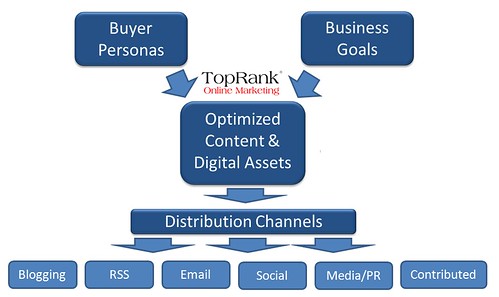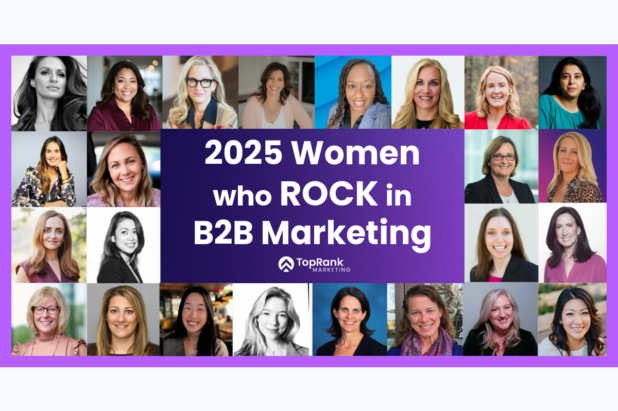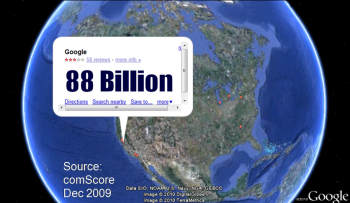 88 billion (OK, 87.8, we rounded up). That’s the number of search queries Google web properties are responsible for each month according to comScore.
88 billion (OK, 87.8, we rounded up). That’s the number of search queries Google web properties are responsible for each month according to comScore.
Core to many search marketing strategies is to “Fish where the fish are” and make no mistake, the fish are decidedly hanging out on Google. YouTube, Gmail, Blogger.com and many other online services from Google make its presence ubiquotous in the online marketing world.
Now imagine if Google disappeared tomorrow. What would that do to your marketing? What would it do to your business?
Some of the people reading this post have experienced such a disappearance. Not of Google going away, but the experience of their own sites or pages disappearing from high visibility positions within Google search results.
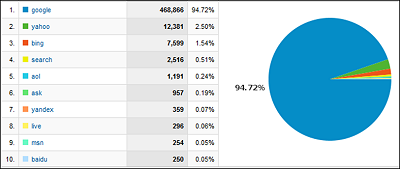
Companies that hyper focus on Google or any singular online channel are not only putting themselves at risk, ala ‘all your eggs in one basket”, they’re also putting themselves at a disadvantage when it comes to search engine marketing.
This is the topic I presented on in the opening keynote at SearchExchange, a budding new search marketing conference held this week in Charlotte, NC. Here is a liveblog post of it from Raven Tools. The conference included familiar names including David Szetela, Chris Winfield, Brent Csutoras, Jon Henshaw, Rae Hoffman, Rhea Drysdale, Sarah Evans, Wayne Sutton and many others.
While Google and search engines present a tremendous opportunity to attract new business, support existing customers, attract new employees and media coverage plus a host of other search outcomes, it’s important to diversify online marketing in a way that also benefits overall search marketing.
There’s a segment of search marketers that use social media in a way that focuses on leveraging networks and influential “power” accounts to drive popularity and traffic to content. The boost in visibility exposes the content to blogs and online news sites, resulting in traffic as well as mentions and links from credible sources.
Social news and bookmarking services have been popular channels for this kind of social media SEO focused marketing. With over 100 million accounts and growth of 300,000 new users per month, Twitter has been added to the mix as well. Well executed promotions or campaigns of this type can drive a substantial amount of traffic and attention.
Another way to include social media in a marketing strategy is to build connections, networks and community within areas of the social web that are meaningful for both short and long term business growth. For many companies, a relationship with customers is worth a lot more than a click, pageview or inbound link.
There’s a significant diversification and SEO productivity opportunity for companies that invest in the creation of an optimized content strategy that incorporates insights from buyer/searcher personas along with business goals. Following through with the development of channels of distribution for that content independent of, but complimentary to search engines like Google, provides exposure to relevant audiences, traffic and links.
“The advantage of adding social media search to your market research toolset is that you’ll get near real-time information that can help you get a head start on the competition on upcoming trends and get much richer detail than a list of generated keywords from search data can provide.”
Vanessa Fox, Author of Marketing in the Age of Google and creator of Google’s Webmaster Central.
The power of a social SEO program focused on content marketing enables companies to realize search engine marketing benefits as well as long term, meaningful connections with a community of customers. “Meaningful connections” means more word of mouth referrals, more purchases per customer, lower attrition and the opportunity to tap into an active fan base for research, consumer generated content and customer evangelists.
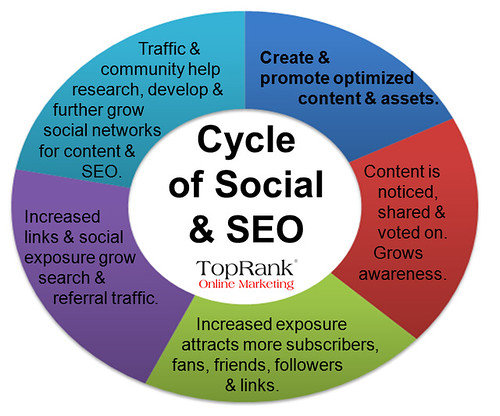
Inspired by Adam Singer’s graphic
Developing and promoting optimized content to relevant networks creates a Social and SEO cycle that expands reach, grows community and improves search engine visibility.
The 2009 Nielsen Global Online Consumer Survey reports that 90% of consumers trust peer recommendations. In contrast, only 14% trust advertisements, (According to “Marketing to the Social Web” published by Wiley). Those statistics highlight the influence of consumer generated content and social network recommendations in contrast to traditional marketing and advertising.
The social web is growing at an incredible pace. According to their timeline, Facebook alone added over 200 million users in less than 12 months. Hitwise has reported that Facebook tops Google for weekly traffic in the U.S. and comScore’s recent Search Engine Ranking report shows that Facebook search is more popular than AOL search. That means SEO for Facebook internal search along with SEO of other niche and internal search engines is something to pay attention to.
As the online experience of information discovery, consumption and sharing changes, so do consumer behaviors. Marketers need to be a few steps ahead of that and know what their customer behaviors are.
SEMPO recently released a new State of the Search Marketing Industry survey with insight specific to social media Marketing. In particular, it includes a number of data points on the intersection of search and social media: 35% of B2B companies integrate social media and search engine marketing programs. For B2C it’s 30%. There’s no reason for those numbers to go anywhere but up.
Marketing Sherpa’s recent Social Media Benchmark Report agrees and shows that SEO goals that social media achieves, very effectively, expanded content in universal search results, increased rankings,traffic from targeted keywords, improved ROI and more qualified leads.
The decision is yours to make. You can focus all your efforts on Google SEO, or you can develop a bigger picture perspective that creates additional relevant traffic channels to your content and at the same time, boosts search engine visibility. In essence, get better results from Google by not focusing exclusively on Google.
Social media marketing, regardless of who “owns” it in an organization can work in concert with SEO efforts to achive branding and community building goals as well as increasing search visibility, web site traffic and online leads/sales. Ultimately, Social SEO and Content Marketing result in more revenue and better customer relationships both in the short and the long term.
